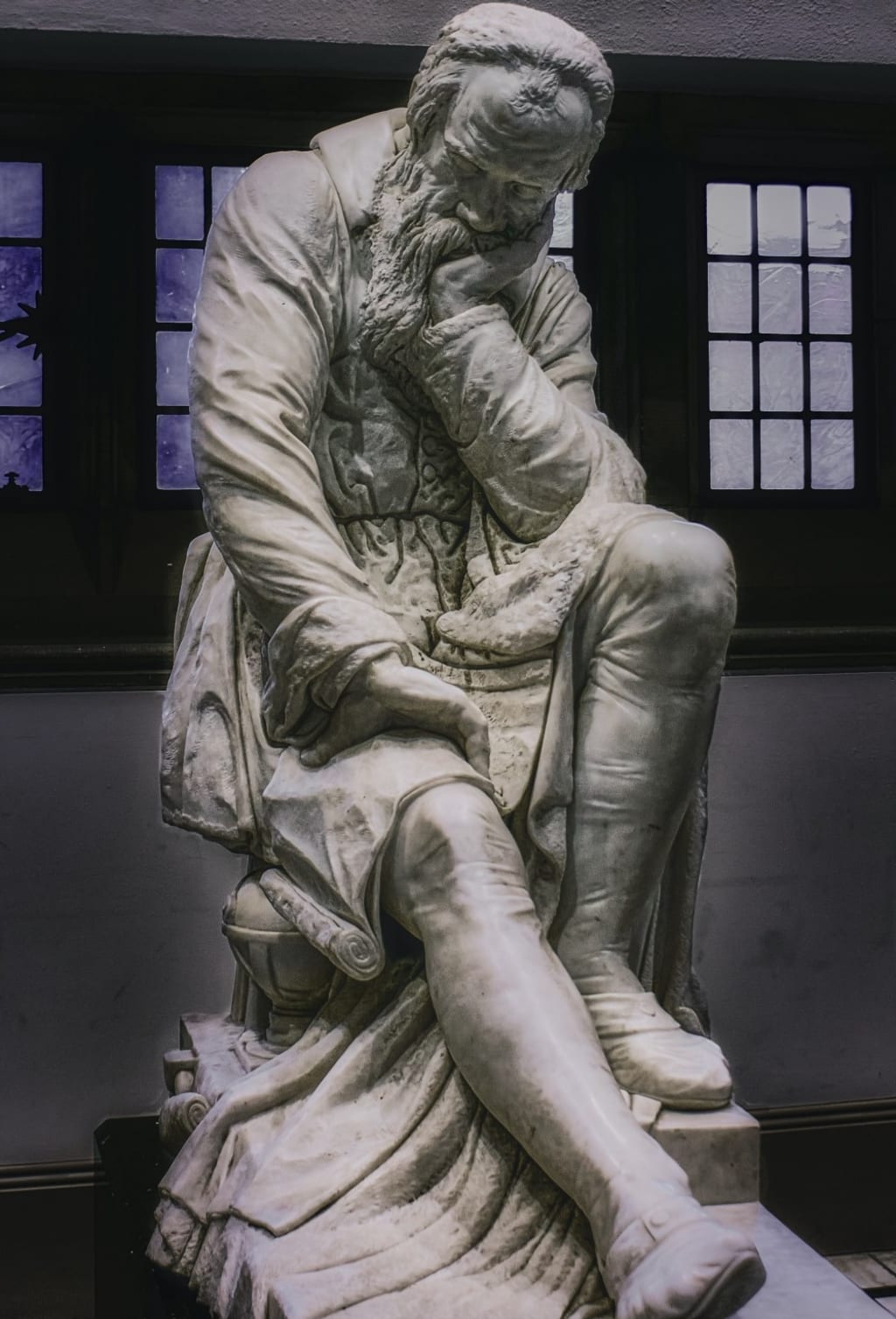4 Major Philosophers & Their Big Ideas
these philosophies shaped our world

Friedrich Nietzsche (1844–1900)
Friedrich Nietzsche was a writer, social pundit, and logician, just as the holder of among the most talented personalities in humanity’s set of experiences. The German mastermind’s arrangement of thoughts would profoundly affect the Western World, contributing profoundly to scholarly talk both during and after his life. Composing on an immense expansiveness of subjects, from history, religion, and science to craftsmanship, culture, and the misfortunes of Greek and Roman Antiquity, Nietzsche composed with savage mind and adoration for incongruity.
He utilized these powers to pen deconstructive assessments of truth, Christian ethical quality, and the effect of social development on our detailing of virtues. Additionally basic to Nietzsche's composing is the pronunciation of skepticism's emergency, the essential thought that everything needs significance, including life itself. This thought specifically would stay a significant segment of the existentialist and surrealist developments that followed.
Nietzsche’s Big Ideas
Supported perspectivism, which held that reality isn’t objective yet is the result of different elements affecting individual point of view;
Explained moral predicament as a pressure between the expert versus slave ethical quality; the previous in which we settle on choices dependent on the evaluation of results, and the last wherein we settle on choices dependent on our origination of good versus evil;
Had confidence in the person’s inventive ability to oppose accepted practices and social shows to live as indicated by a more prominent temperance arrangement.
Nietzsche’s Key Works
The Birth of Tragedy (1872)
The Gay Science (1882)
On the Genealogy of Morals and Ecce Homo (1887, 1908)
David Hume (1711–77)
A Scottish-conceived antiquarian, financial analyst, and scholar, Hume is regularly assembled with masterminds, such as John Locke, Thomas Hobbes, and Sir Francis Bacon, as a component of a British development Empiricism. He has centered around making a “naturalistic study of man” that digs into the mental conditions characterizing human instinct. Rather than realists, for example, Descartes, Hume was distracted by how interests (instead of reason) administer human conduct.
This, Hume contended, inclined people to information established not on the presence of specific absolutes but rather on close to home insight. As a result of these thoughts, Hume would be among the principal significant masterminds to discredit narrow-minded strict and reasonable goals for a more sentimentalist way to deal with human instinct. His conviction framework would help educate the future developments regarding utilitarianism and intelligent positivism and would profoundly affect logical and religious talk from that point.
Hume’s Big Ideas
Explained the “issue of enlistment,” recommending we can’t judiciously legitimize our faith in causality, that our discernment permits us to encounter occasions that are regularly conjoined, and that causality can’t be observationally declared as the associating power in that relationship;
Evaluated that people come up short on the ability to accomplish a genuine origination of oneself, that our origination is simply a “heap of sensations” that we associate with define the possibility of oneself;
Hume contended against moral absolutes, instead of placing that our ethical conduct and treatment of others are constrained by feeling, supposition, and inward interests. We are slanted to acceptable practices by their possible attractive results.
Hume’s Key Works
A Treatise of Human Nature (1739)
An Enquiry Concerning the Principles of Morals (1751)
The History Of England (1754–62)
Karl Marx (1818–83)
A German-conceived financial analyst, political scholar, and rationalist, Karl Marx kept in touch with the absolute most progressive philosophical substance ever created. In reality, so appropriate was his composition to the human condition during his lifetime, he was ousted from his local nation. This occasion would notwithstanding, making it workable for his most effective plans to locate a well-known crowd. After showing up in London, Marx took up work with individual German Friedrich Engels. Together, they formulated an evaluation of class, society, and force elements that uncovered profound disparities and uncovered the monetary rights for state-supported viciousness, mistreatment, and war.
Marx anticipated that the imbalances and savagery natural in the private enterprise would, at last, prompt its breakdown. From its remains would rise another communist framework, a ridiculous society where all members (instead of merely affluent private proprietors) approach creation methods. What made the Marxist arrangement of thought so significant was its intrinsic source of inspiration, framed in Marx’s backing for an average transformation pointed toward toppling an inconsistent framework. The way of thinking basic Marxism, and his progressive enthusiasm, would swell all through the world, eventually changing whole circles of thought in places like Soviet Russia, Eastern Europe, and Red China. From numerous points of view, Karl Marx directed a philosophical transformation that proceeds in the current day in horde types of socialism, communism, a mingled majority rules system, and grassroots political association.
Marx’s Big Ideas
Supported a view called recorded realism, contending for the demystification of thought and vision for closer affirmation of the physical and material activities molding the world;
Contended that social orders create through class battle and that this would at last prompt the destroying of private enterprise;
Described private enterprise as a creative framework in which there are intrinsic irreconcilable situations between the bourgeoisie (the decision class) and the low grade (the average workers), and that these contentions are framed in the possibility that the last should offer their work to the previous for compensation that offers no stake underway.
Marx’s Key Works
Critique of Hegel’s “Philosophy Of Right” (1843)
The Communist Manifesto (1848)
Capital: Volume 1: A Critique of Political Economy (1867)
20. Ludwig Wittgenstein (1889–1951)
Conceived in Austria to an affluent family, Wittgenstein is one of the theory’s more colorful and bizarre characters. He carried on with an existence of unusualness and expert nomadism, fiddling with the scholarly community, military help, instruction, and even as an emergency clinic deliberate. Additionally, during his life, he composed voluminously; however, he distributed just a solitary composition. But then, he was perceived by his counterparts as a virtuoso.
The after-death distribution of his numerous volumes affirmed this view for people in the future, eventually delivering Wittgenstein a transcending figure in the zones of rationale, semantics, and the way of thinking of the brain. His phonetics and brain research examinations would demonstrate especially dramatic, offering a separate window through which to recently comprehend the idea of the importance and constraints of human origination.
Wittgenstein’s Big Ideas
Contended that calculated disarray about language is the reason for most intelligent strain in theory;
Attested that the significance of words surmises our comprehension of that importance and that our specific task of volume comes from the social and social builds encompassing us;
Settled that since thought is inseparably attached to language, and because language is socially developed, we have no open inward space for acknowledging our considerations, or, in other words, that the language of our musings delivers our contemplations intrinsically socially built.
Wittgenstein’s Key Works
Tractatus Logico-Philosophicus (1921)
Philosophical Investigations (1953)
On Certainty (1969)
About the Creator
Fahim Chughtai
Mental Health, Personal growth, Relationships.






Comments
There are no comments for this story
Be the first to respond and start the conversation.